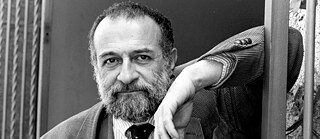On the death of SAID
Language, poetry, body, exile

SAID died on 15th May at the age of 73. In 2006, the Iranian-German writer received the Goethe Medal. An obituary.
By Martin Hielscher
When SAID visited the Verlag C.H.Beck publisher in the building on Ainmillerstraße in Munich, where eleven of his books and one audio book have been published, and where the small fiction department is also based, it was as if the pulse of the building started beating faster. From the colleague at reception, who has a Persian surname to which he responded immediately, to the trainee who had attended one of his readings, which he had remembered, to his entrance into my office – he was overwhelmingly present. Usually, as soon as he entered – he drank an espresso, I took his coat; for many years, until his first serious heart attack, he first smoked a cigarette – he would tell you an anecdote, a joke, an incident, an experience from one of his readings. He was always immaculately dressed, connected with you immediately, engaged you in conversation straight away, smiling, warm, close. And he was always about the essential things – SAID was never trivial, although he could be entertaining, approachable, humorous. The essential things – how could one describe it? Language, poetry, the body, exile, love, but also sexuality, song, including the religious kind, pain, persecution, degradation, but also paintings, music, friendship.
SAID was born in Tehran in 1947; his parents had separated before he was born and he grew up with his father, left Iran at the age of 17, and lived in Munich from 1965 onwards. He had been involved in the student movement and recognised in the mullah regime that followed the 1979 Iranian Revolution, the same repression that had already existed under the Shah. When SAID had the opportunity to get to know his mother for the first time as an adult – “Landschaften einer fernen Mutter” (2001) bears witness to this – he had to admit in the end that this encounter had failed, as had a reconciliation with his country of origin. SAID loved and needed the Persian language and culture, but his home, if there was a home for him, became the German language. And he became one of the most remarkable German poets, whose lyrical language, indeed the language of all his texts – because in addition to poems and psalms, he also wrote children’s books, essays, stories, autobiographical prose, radio plays, pictorial reflections and much more – had a purity, a kind of stripped-down clarity, a sharpness, a richness of perception and imagery that nevertheless had nothing ornamental or baroque about it. He received the Goethe Medal for his services to German language and culture in 2006; for his commitment to persecuted and imprisoned writers, he was awarded the Hermann Kesten Medal of the PEN Center, Germany and functioned as the president of this organisation between 2000-2002. Among other awards, he received the Literary Prize of the state capital of Munich, the Adelbert von Chamisso Prize, the Friedrich Rückert Prize and Cross of Merit on ribbon of the Federal Republic of Germany.
There was something radical about SAID – from the indignation, clear-sightedness and pain of his “Aufzeichnungen aus meinem Exil” (“Notes from my exile”) which was published under the title “Der lange Arm der Mullahs” (“The long arm of the mullahs”) in 1995, as well as his “Psalmen” (“Psalms”, 2007); from his “Liebesgedichte” (“Love poems”, 1989) to the stories in “flüstern gegen die wölfe” (“whisper against the wolves”, 2021). His radicality was as true to pain as to the desire for closeness and the overwhelmingness of love; it never grew tired of raging against injustice, abuse of power and persecution as well as the joy in the beauty of language and the possibility we have to transcend ourselves and our loneliness through language, devotion and the quest, which SAID was concerned with, for a non-denominational spirituality. SAID died of a heart attack in his apartment on 15th May 2021.
lord
I believe in the flesh
its profligacy and its obstinacy
and if through this tête-à-tête
I arouse your empty place
I will be filled with the hope
that our dialogue will become a prayer
for the lonelySAID : “Psalms” (2007)